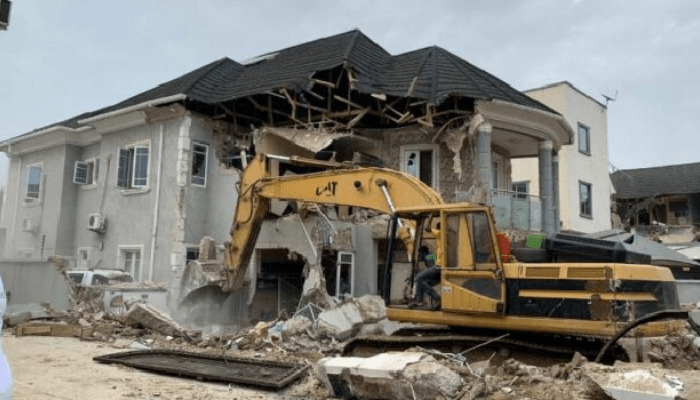Lagos Demolitions: Housing Crisis Worsens as Thousands Left Homeless

By Taiwo Ajayi
The recent spate of building demolitions in Lagos has sparked heated debate and controversy, leaving many questions unanswered and residents struggling with the aftermath. While the government justifies the action as necessary to enforce building regulations and address safety concerns, others argue that it is a “needless and avoidable waste” that disregards the social and economic consequences.
The extent of the demolitions is significant, with thousands of structures targeted by both the Lagos State government and the Federal Housing Authority (FHA). Affected communities range from Ikota and Lekki to Alaba, Ajao Estate, and Abule Ado. The justifications vary, with some buildings cited as violating building codes and others deemed illegally constructed on drainage channels or other prohibited areas.
Read Also: Homeless in Lagos: Residents Struggle for Shelter After Demolition
However, critics point out that the government’s response seems reactive rather than proactive. They argue that authorities should have prevented these constructions in the first place instead of resorting to demolitions after the fact. This lack of proactive enforcement, they claim, not only allows illegal structures to flourish but also puts residents at risk.
Another major concern is the severe impact on residents. The demolitions have displaced thousands of people, leaving them homeless or forcing them to become tenants. This not only disrupts their lives but also exacerbates the already critical housing shortage in Lagos, where the deficit exceeds 3 million units.
Experts further emphasize the economic consequences of these demolitions. They argue that each destroyed building represents a lost investment that could have contributed to the real estate sector and the broader economy. Moreover, the demolitions discourage future investments, hindering development and growth.
READ ALSO: Hostile Economy- Landlords are driving us crazy with rent increase Tenants cry out to govt.
The issue also raises numerous ethical questions. Critics argue that the government should be more compassionate and ensure alternatives for displaced residents before resorting to such drastic measures. Additionally, the role of corrupt officials and developers in enabling illegal construction also comes under scrutiny.
While the government defends its actions as necessary to enforce law and order, the long-term consequences of these demolitions remain unclear. Ultimately, finding a sustainable solution requires addressing the root causes of illegal construction, improving enforcement mechanisms, and prioritizing the well-being of residents.
Furthermore, the demolitions highlight the urgent need to address the chronic housing shortage in Lagos. The government needs to implement effective policies that encourage affordable housing development and provide adequate alternatives for displaced residents.
The situation in Lagos serves as a cautionary tale, prompting a nationwide conversation about building regulations, enforcement strategies, and the human costs of urban development. Only through a balanced and compassionate approach can we ensure urban spaces that are safe, sustainable, and cater to the needs of all residents.





